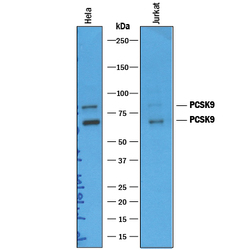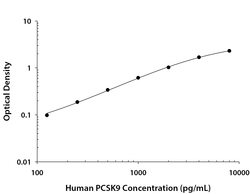Antibody data
- Antibody Data
- Antigen structure
- References [5]
- Comments [0]
- Validations
- Western blot [1]
- ELISA [1]
Submit
Validation data
Reference
Comment
Report error
- Product number
- AF3888 - Provider product page

- Provider
- R&D Systems
- Product name
- Human Proprotein Convertase 9/PCSK9 Antibody
- Antibody type
- Polyclonal
- Description
- Antigen Affinity-purified. Detects human PCSK9 in direct ELISAs and Western blots. In direct ELISAs, approximately 50% cross-reactivity with recombinant mouse PCSK9 is observed.
- Reactivity
- Human
- Host
- Sheep
- Conjugate
- Unconjugated
- Antigen sequence
Q8NBP7- Isotype
- IgG
- Vial size
- 100 ug
- Concentration
- LYOPH
- Storage
- Use a manual defrost freezer and avoid repeated freeze-thaw cycles. 12 months from date of receipt, -20 to -70 °C as supplied. 1 month, 2 to 8 °C under sterile conditions after reconstitution. 6 months, -20 to -70 °C under sterile conditions after reconstitution.
Submitted references 6-Gingerol Regulates Hepatic Cholesterol Metabolism by Up-regulation of LDLR and Cholesterol Efflux-Related Genes in HepG2 Cells.
Heparan sulfate proteoglycans present PCSK9 to the LDL receptor.
Common Proprotein Convertase Subtilisin/Kexin Type 9 (PCSK9) Epitopes Mediate Multiple Routes for Internalization and Function.
Loss of plasma proprotein convertase subtilisin/kexin 9 (PCSK9) after lipoprotein apheresis.
Antibody-mediated disruption of the interaction between PCSK9 and the low-density lipoprotein receptor.
Li X, Guo J, Liang N, Jiang X, Song Y, Ou S, Hu Y, Jiao R, Bai W
Frontiers in pharmacology 2018;9:159
Frontiers in pharmacology 2018;9:159
Heparan sulfate proteoglycans present PCSK9 to the LDL receptor.
Gustafsen C, Olsen D, Vilstrup J, Lund S, Reinhardt A, Wellner N, Larsen T, Andersen CBF, Weyer K, Li JP, Seeberger PH, Thirup S, Madsen P, Glerup S
Nature communications 2017 Sep 11;8(1):503
Nature communications 2017 Sep 11;8(1):503
Common Proprotein Convertase Subtilisin/Kexin Type 9 (PCSK9) Epitopes Mediate Multiple Routes for Internalization and Function.
DeVay RM, Yamamoto L, Shelton DL, Liang H
PloS one 2015;10(4):e0125127
PloS one 2015;10(4):e0125127
Loss of plasma proprotein convertase subtilisin/kexin 9 (PCSK9) after lipoprotein apheresis.
Tavori H, Giunzioni I, Linton MF, Fazio S
Circulation research 2013 Dec 6;113(12):1290-5
Circulation research 2013 Dec 6;113(12):1290-5
Antibody-mediated disruption of the interaction between PCSK9 and the low-density lipoprotein receptor.
Duff CJ, Scott MJ, Kirby IT, Hutchinson SE, Martin SL, Hooper NM
The Biochemical journal 2009 May 1;419(3):577-84
The Biochemical journal 2009 May 1;419(3):577-84
No comments: Submit comment
Supportive validation
- Submitted by
- R&D Systems (provider)
- Main image

- Experimental details
- Detection of Human Proprotein Convertase 9/PCSK9 by Western Blot. Western blot shows lysates of HeLa human cervical epithelial carcinoma cell line and Jurkat human acute T cell leukemia cell line. PVDF membrane was probed with 1 µg/mL of Sheep Anti-Human Proprotein Convertase 9/PCSK9 Antigen Affinity-purified Polyclonal Antibody (Catalog # AF3888) followed by HRP-conjugated Anti-Sheep IgG Secondary Antibody (Catalog # HAF016). A specific band was detected for Pre-Proprotein Convertase 9/PCSK9 at approximately 80 kDa and mature Proprotein Convertase 9/PCSK9 60 kDa (as indicated). This experiment was conducted under reducing conditions and using Immunoblot Buffer Group 1.
Supportive validation
- Submitted by
- R&D Systems (provider)
- Main image

- Experimental details
- Human Proprotein Convertase 9/PCSK9 ELISA Standard Curve. Recombinant Human Proprotein Convertase 9/PCSK9 protein was serially diluted 2-fold and captured by Rat Anti-Human Proprotein Convertase 9/PCSK9 Monoclonal Antibody (Catalog # MAB38883) coated on a Clear Polystyrene Microplate (Catalog # DY990). Sheep Anti-Human Proprotein Convertase 9/PCSK9 Antigen Affinity-purified Polyclonal Antibody (Catalog # AF3888) was biotinylated and incubated with the protein captured on the plate. Detection of the standard curve was achieved by incubating Streptavidin-HRP (Catalog # DY998) followed by Substrate Solution (Catalog # DY999) and stopping the enzymatic reaction with Stop Solution (Catalog # DY994).
 Explore
Explore Validate
Validate Learn
Learn Western blot
Western blot Immunoprecipitation
Immunoprecipitation